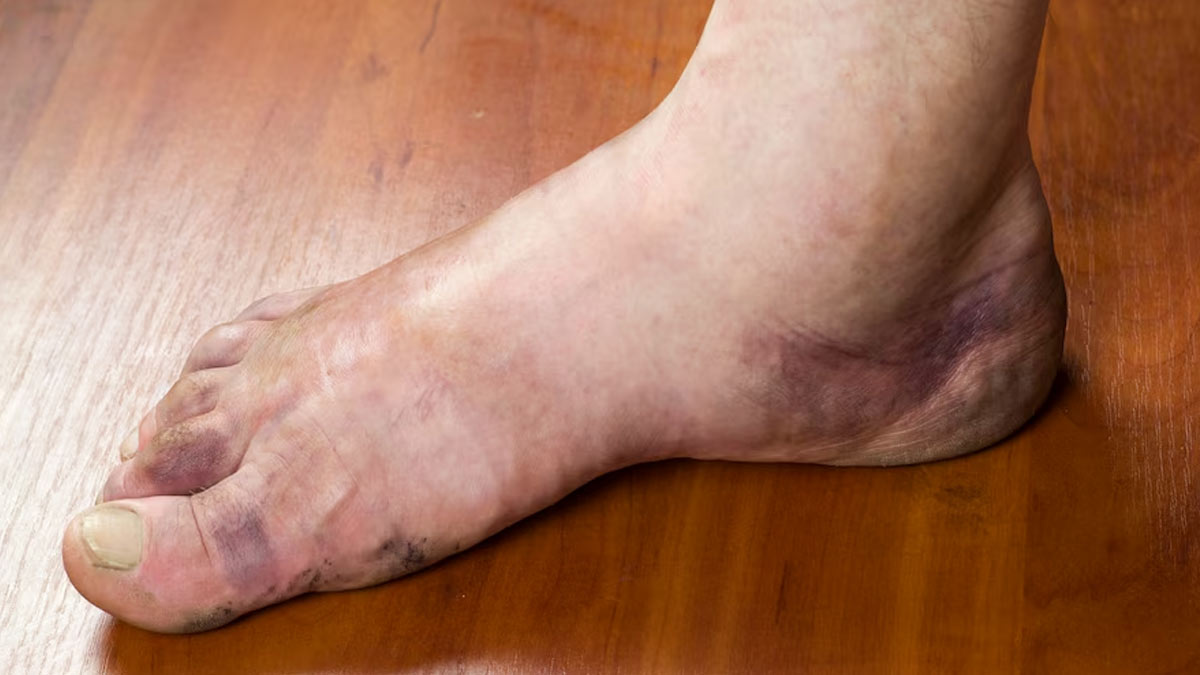
For people with diabetes, proper foot care is crucial throughout the year. However, the monsoon season presents unique challenges that require extra vigilance. Increased moisture, coupled with potential injuries from wet surfaces, can create a breeding ground for infections and complications, according to a study published in the International Journal of Environmental Research and Public Health. Here's a comprehensive guide to caring for your diabetic feet during the monsoon:
Table of Content:-
Choose The Right Footwear In Monsoon
The first step to protecting your feet during monsoon, especially if you have diabetes, is to choose the right footwear:
- Ditch the Open Shoes: While sandals and flip-flops might seem like the perfect choice for wet weather, they offer minimal protection. Opt for closed-toe shoes made from breathable materials like leather or mesh, suggested the American Diabetes Association. Ensure they fit well, with ample space for your toes to wiggle freely.
- Waterproof Options: Consider investing in a pair of water-resistant shoes for heavy monsoon downpours. Look for shoes with good traction to prevent slips and falls on wet surfaces.
- Regular Inspections: Get into the habit of checking your shoes for any sharp objects or debris lodged inside before wearing them. This can help prevent cuts or scrapes that could lead to infections.

Keep Your Feet Dry
The next crucial aspect of keeping your feet safe during monsoon is to keep it dry and clean. Follow these steps:
- Thorough Drying: After venturing out in the rain, take off your shoes and socks immediately. Wash your feet with lukewarm water and mild soap, paying close attention to the areas between your toes. Dry them meticulously with a soft towel, ensuring no moisture remains, especially between the toes.
- Moisturise Wisely: While keeping your feet dry is essential, neglecting proper moisturisation can lead to cracked skin, increasing the risk of infection. Apply a fragrance-free moisturiser specifically designed for diabetic feet, focusing on the tops and bottoms of your feet. Avoid applying lotion between the toes.
Maintain Good Circulation In Feet
If you have diabetes, keeping your feet locked away during monsoon can also hinder circulation, which can put your feet at risk. Try these steps:
- Regular Foot Checks: Develop a daily routine of inspecting your feet for any cuts, bruises, blisters, or swelling. Pay close attention to areas where neuropathy (nerve damage) might make it difficult to feel sensations, like the soles of your feet.
- Elevate Your Feet: Throughout the day, take breaks to elevate your feet above your heart level. This helps improve circulation and reduce swelling, especially if you've been standing or walking for extended periods.
- Maintain Blood Sugar Control: High blood sugar levels can significantly impact blood flow and increase the risk of infections. Work closely with your doctor to manage your blood sugar effectively through diet, medication, and exercise.
Also Read: Diabetic Foot Symptoms: 6 Signs You Should Not Ignore

Additional Monsoon-Specific Tips
In addition to the above steps, these precautions can further prevent your feet from getting infected:
- Mind Your Steps: Be extra cautious while walking on wet surfaces. Slippery floors and uneven pavements can increase the risk of falls. Take smaller steps and use a walking stick if necessary for added stability.
- Beware of Hidden Dangers: Stagnant water puddles and flooded areas can harbour bacteria and fungus. Avoid walking through them whenever possible.
- Footwear Hygiene: Don't neglect your footwear hygiene. Regularly clean and disinfect your shoes, especially if they get wet. Allow them to dry completely before wearing them again. Consider keeping a spare pair of dry shoes handy.
Also Read: Dealing With Diabetic Foot Ulcers? Here're The Expert Tips To Manage Them Effectively
If you notice any concerning changes in your feet, such as redness, swelling, blisters, or persistent pain, don't hesitate to consult your doctor or podiatrist immediately. Early diagnosis and treatment can prevent serious complications.
Remember, consistent self-care is paramount for diabetic foot health, especially during the monsoon season. By following these tips and staying vigilant, you can keep your feet healthy and prevent complications.
Also watch this video
How we keep this article up to date:
We work with experts and keep a close eye on the latest in health and wellness. Whenever there is a new research or helpful information, we update our articles with accurate and useful advice.
Current Version